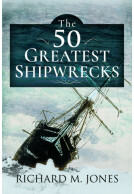Lost at Sea in Mysterious Circumstances (Hardback)
Vanishings and Undiscovered Shipwrecks
Imprint: Pen & Sword History
Pages: 208
Illustrations: 32 mono illustrations
ISBN: 9781399046213
Published: 21st September 2023
(click here for international delivery rates)
Order within the next 11 hours, 27 minutes to get your order processed the next working day!
Need a currency converter? Check XE.com for live rates
| Other formats available - Buy the Hardback and get the eBook for £1.99! | Price |
|---|---|
| Lost at Sea in Mysterious Circumstances ePub (8.1 MB) Add to Basket | £6.99 |
When you think of something being lost at sea, you imagine a ship sinking gracefully, the survivors being rescued or a tragedy being caught on camera. But what if a ship is lost at sea without trace? What if an aircraft takes off on a routine flight and is never seen again? This book details over fifty of the most mysterious vanishings, ships that have made headlines but have never been found, both famous and forgotten cases that have left an outward ripple of tragedy and mystique.
Most people have heard of the Mary Celeste crew vanishing, but how many knew that this was not the last case of an entire crew going missing? What about the three Scottish lighthouse keepers who were never seen again? Or the world famous aviation pioneers who took flight to never return?
This book will tell you that MH370 was not the first airliner to disappear over the sea, nor was the Bermuda Triangle actually the cause of so many disappearing ships. How could six airplanes disappear in one day? Why did a ship with over 300 people on board not send a single distress call? Which ships vanished and then later messages in a bottle suddenly turn up, not just once but two separate shipwrecks?
Lost at Sea in Mysterious Circumstances will cover all these and more as we reveal the stories of some of the most fascinating incidents above and below the waves.
Once read, these stories are hard to forget, as they are infused with intrigue and tragedy that will ensure that they remain in your mind long after you have put the book down. Jones writes in his acknowledgments: ‘If I have brought any of these stories to light enough to keep it remembered then this book has served its
Mollie Carlyle, International Journal of Maritime History
purpose’ (p. 191). In this statement, the work will no doubt achieve its goal. This reader will certainly remember these stories, those who lost their lives and the mysterious circumstances surrounding the events that Jones describes for many years to come.
I found this book to be a really enjoyable read, that anyone would be delighted to have in their library.
Vintage Airfix
Read the Full Review Here
Well recommended as a stocking stuffer for those who like a bit of mystery with their maritime history.
David Collins, The Naval Review
Well recommended as a stocking stuffer for those who like a bit of mystery with their maritime history.
David Collins, The Naval Review
There are fifty-six three page synopses of mysteries at sea ranging from “Atlantis – A Continent Lost?” to the Malaysian aircraft “MH370” that crashed somewhere in the south Indian Ocean and remains an unsolved mystery. I won’t attempt to fully cover all the stories but have selected five that have a particular appeal.
John M Bingeman, Royal Naval Sailing Association
The first is HMS Barham - a First World War battleship that had been damaged in the Battle of Jutland (1916) with six killed and twenty-six injured. Returning from the Mediterranean during World War Two, she was damaged by a torpedo and needed to be docked at Birkenhead. She then went back to the Mediterranean, took part in the Battle of Matapan and saw more action before being hit by three torpedoes fired by U-331.This caused her magazine to explode in an almighty explosion featured among the Book’s illustrations - one is truly amazed how 450 of the crew survived. Her loss was kept secret from the public but Helen Duncan at Portsmouth held a séance with the spirit of a Barham sailor saying she had sunk. Under the Witchcraft Act of 1735, Helen Duncan was arrested, found guilty and sent to prison for nine months, the last witch trial in the United Kingdom.
The second is SS Rawalpindi - my family was joining my Father who was serving in HMS Barham in the Mediterranean in January 1939. While heading for Malta, I have memories of Rawalpindi being hove-to in the Bay of Biscay shaking violently every time her screws came out of the water. At the outbreak of WW2, Captain Kennedy (father of Ludovic Kennedy) was in command of Rawalpindi, now an Armed Merchant Cruiser with eight 6-inch guns. Cornered by the Scharnhorst & Gneisenau she suicidally in the true tradition of the Royal Navy attacked. Today, the location of her wreck site remains a mystery.
The third is the battle-cruiser HMS Glorious - she was my Father’s first ship as a Midshipman, taking part in the Second Battle of Heligoland Bight (1917) when she suffered several hits. She was converted to be an aircraft-carrier which was completed in 1930. She collided with the French liner Florida and needed repairs to her crumpled bow at Gibraltar. World War Two saw her searching for the German raider Admiral Graf Spee before being heavily involved with flying operations around Narvik in Norway. Her Captain, a highly decorated submariner was unsuited to the command of a carrier. After he had sacked his Commander (Air), he failed to keep air cover on the return passage thus missing the opportunity of being warned of the presence of the Scharnhorst and Gneisenau. It might have saved her, and her two escorting destroyers that were all sunk.
The fourth choice is Foxtrot 4 – I had earlier been the MEO (Chief Engineer) of Fearless and was very familiar with her eight landing craft. During the 1982 Falkland Operation Corporate both she and her sister Intrepid, LPDs (Landing Platform Dock), were vital to the success of the operation. Colour Sergeant Brian Johnson, coxswain of Fearless’s LCU (Landing Craft Utility) Foxtrot 4 went alongside Antelope, on fire with an unexploded bomb, rescuing over a hundred survivors just prior to the bomb exploding. Later when F4 was delivering stores in support of the Army she was hit by a 500lb bomb killing Johnson and five of his crew. Brian Johnson was deservedly awarded the Queens Gallantry Medal Posthumously for selfless bravery in the face of extreme danger.
The fifth choice is cruise liner SS Lakonia – on the 23rd December 1963 she was on fire west of Gibraltar with 646 passengers among the 1,022 onboard. HMS Centaur was diverted to assist; she went ‘Full Ahead’ exceeding her official full power with the backs of our boilers glowing red as she raced to help the stricken ship. On arrival the next afternoon, Lakonia was surrounded by merchantmen who had successfully rescued everyone except 128 people that included 95 passengers who had all drowned. Centaur’s ship’s boats set about recovering floating bodies while her helicopter collected more bodies from merchantmen. Christmas Day saw us landing them at Gibraltar. The Norwegian tug Herkules towed Lakonia east until she sank.
As featured in
Southern Daily Echo (Southampton)
About Richard M Jones
RICHARD M. JONES is an author of twenty other books on history and shipwrecks, having been fascinated by lost ships since an early age. As well as placing twelve memorials to different forgotten disasters he still has time to study for future projects as well as serve at sea with the Royal Navy.
















